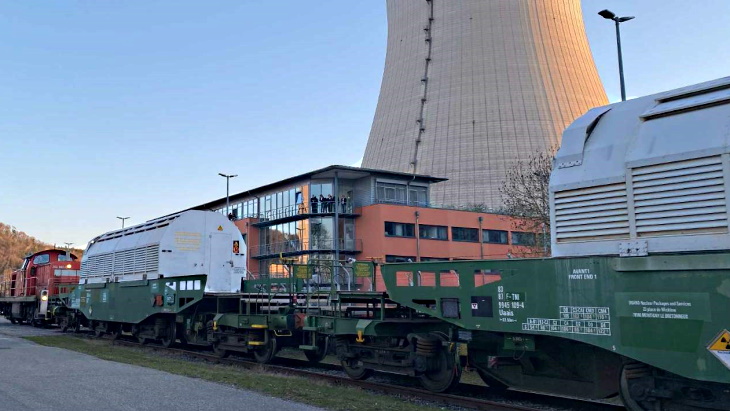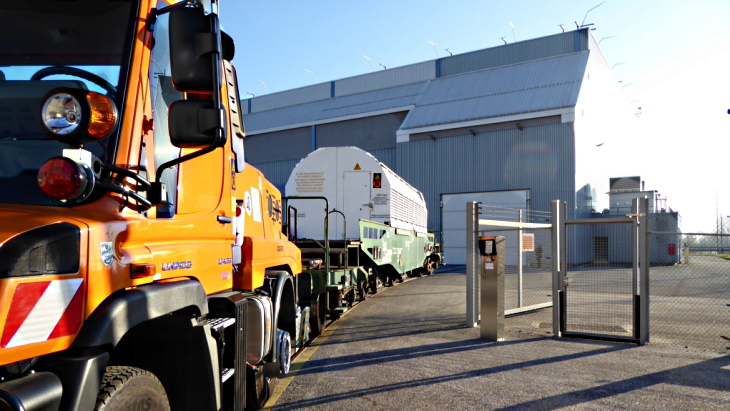Seven flasks containing the vitrified residues - the radioactive waste has been transformed into a stable glass-like form - travelled by rail from the Sellafield site in Cumbria to the port of Barrow-in-Furness before being loaded on to the Pacific Grebe, a specialist nuclear transport vessel operated by the UK's Nuclear Transport Solutions (NTS), which set sail on 26 March.
Having arrived at the northern German port of Nordenham, the flasks were transferred from the ship to railway wagons on 1 and 2 April. The waste was then transported by rail to the Isar federal storage facility, arriving on 3 April.
Over the coming days, the containers will gradually be transferred to the interim storage building. There, they will first be prepared in the maintenance area by the interim storage operator, the federally owned BGZ Gesellschaft für Zwischenlagerung mbH, and then stored.

The waste arrives at Isar site by train (Image: PreussenElektra)
"The storage of the seven containers in the interim storage facility marks the end of a comprehensive project that involved intensive preparation at a high level of security," says Markus Luginger, head of the Isar interim storage facility. "I would like to thank my dedicated team and the institutions involved with whom we prepared the storage."
Germany's Federal Office for the Safety of Nuclear Waste Management (BASE) issued a licence in April 2023 for the storage of the vitrified waste at the Isar interim storage facility, which is licensed to hold a maximum of 152 casks of high-level radioactive waste and "according to current plans, there will be 28 fewer high-level waste casks there than originally intended, including the casks containing the vitrified waste".
Until 2005, German utilities shipped used fuel from nuclear power plants to La Hague in France and Sellafield in the UK for reprocessing and recycling. The utilities have contractually committed to taking back waste from the reprocessing of their fuel elements abroad. Furthermore, there are international agreements between Germany and the UK that ensure this takeback.
Until 2011, reprocessed waste was sent to the Gorleben interim storage facility in Lower Saxony, where 108 casks of vitrified radioactive waste have been stored, which was "already a large proportion of the total waste to be returned from reprocessing". According to BASE, as part of the Site Selection Act of 2013 to seek a repository for high-level radioactive waste, the remaining vitrified waste abroad was to be stored in interim storage facilities at nuclear power plant sites.

One of the flasks at the Isar interim storage facility (Image: BGZ)
The first shipment from the UK, of six flasks each with 28 containers of high-level waste, to Biblis, took place in 2020.
Sellafield Ltd's programme manager Jonathan Clingan said: "Thanks to the excellent work of various teams at Sellafield Ltd, NTS and other partners in the UK and overseas, we have safely delivered the second Vitrified Residue Return to Germany, delivering a key milestone in the UK government's commitment to returning waste to overseas customers."
"Following the successful transport to the Isar site, we are confident that the final transport of reprocessing waste to Brokdorf will proceed just as smoothly," said Guido Knott, Managing Director of PreussenElektra. That shipment is scheduled to take place next year.
France's Orano completed the 13th and final rail shipment from France of vitrified high-level nuclear waste, to Philippsburg, in Germany in November 2024. In total 5310 tonnes of German used fuel was processed at Orano's La Hague plant up to 2008. The inter-governmental agreement governing those operations included a provision that the equivalent in mass and radioactivity of the waste contained in the used fuel elements must be returned to Germany.

_80580.jpg)













